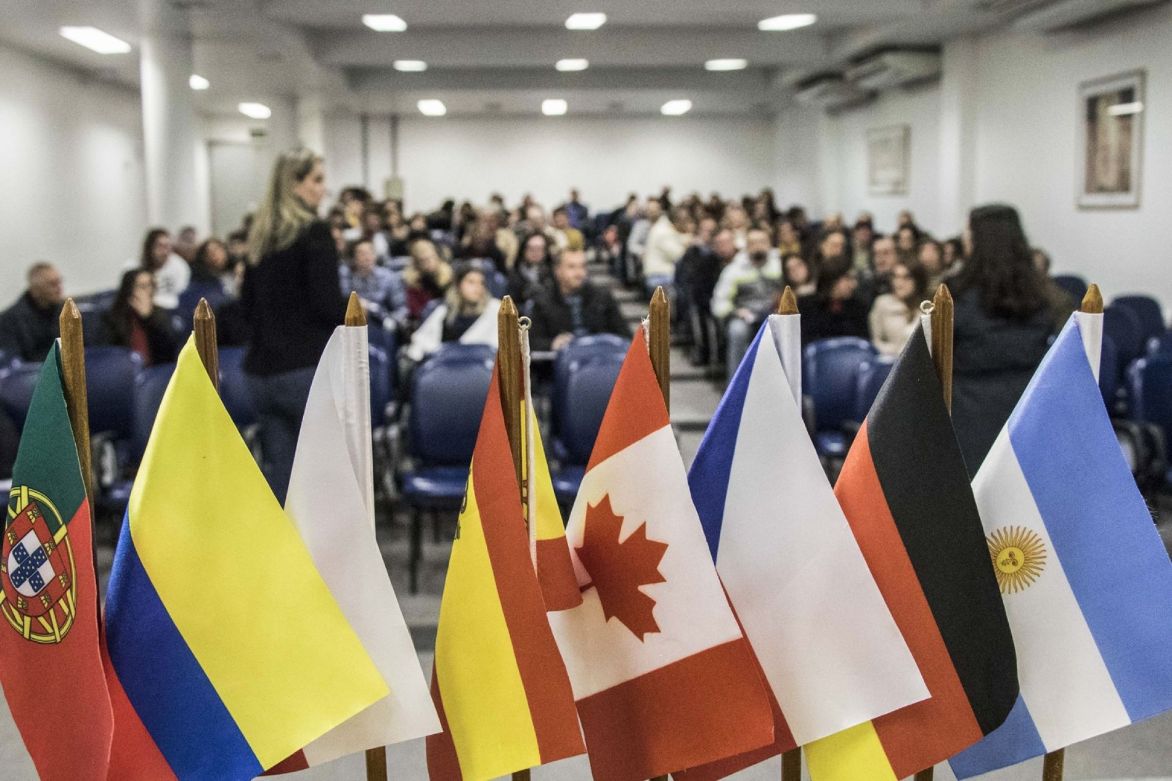Exchange students investigate sustainable development in rice-growing areas in the Pampas agricultural biome
Postado as 01/12/2022 11:32:20
Por Lucas George Wendt
Fique por dentro de tudo o que acontece na Univates, clique nos links a seguir e receba semanalmente as notícias diretamente no seu WhatsApp ou no Telegram.
Clique aqui para conferir o texto em Português
Students Emma Fransson and Tekla Tingström, who were on an exchange program at Universidade do Vale do Taquari - Univates in the first half of 2022, recently published a study that analyzed how activities in rice growing areas in the agricultural biome of the Pampas in Southern Brazil affect the local biodiversity.
The duo's study, a prerequisite for obtaining a bachelor's degree in Environment, Innovation and Sustainability Studies at the University of Halmstad, in southwest Sweden, can be seen by clicking here (in English). The research relates the study of sustainable development and the 2030 Agenda, since it is strongly related to the Sustainable Development Goal 15 - Life on Earth.
The research was carried out at Univates' Laboratory of Ecology and Evolution, coordinated by Professor Eduardo Périco, who supervises the students in Brazil. The laboratory's master's fellows, Pauline Vognach and Cléber Sganzerla, also participated in all the work, especially in field collections and species identification. In Sweden, research was overseen by researchers Antonia Liess and Göran Sahlen, with whom Périco has research partnerships.
To conduct the research, the students used aquatic insects and related richness (number of species), abundance and composition (which species were present) in three different sampling points: organic rice fields, conventional rice fields (with pesticides and fertilizers) and natural wetlands (control areas, with no cultivation). The objective was to verify whether the aquatic insect community varied between areas and, based on the results, to be able to use these organisms as indicators of the degree of anthropization of the environment.
Aquatic insects are considered excellent environmental indicators, as they are organisms sensitive to any anthropic alteration in the environment, especially polluting agents, pesticides and alterations in the surrounding landscape of water bodies.
The Swedish students also related the species of aquatic insects with the physicochemical characteristics of the water. In this way, they managed to verify how the communities of these insects react to pesticides and fertilizers in comparison to areas of organic cultivation and natural areas. The use of pesticides changes the physicochemical characteristics of the water, such as pH, redox potential, free oxygen, dissolved solids, nitrites and nitrates. Data were collected in the field and analyzed at Univates laboratories.
The results did not show a significant influence of nitrogen on the richness or abundance of insects and nitrite shows a significant influence, but not enough to make significant inferences. The water parameters with the highest correlation with the insect community in this study were pH, redox potential (ORP), conductivity and total dissolved solids. These results indicated that in conventional cultivation (with the use of pesticides and fertilizers) the water became more acidic and with greater conductivity, favoring more generalist insect species, changing the composition of the insect community in relation to areas with organic cultivation and without cultivation ( natural areas).
Both the measured pH value and the ORP are strongly correlated with the chemical state of the water and the insects that live there. A pH value that is too high or too low is not favorable for aquatic insects or water biodiversity, nor is an ORP value that is too low.
The students argue that the focus of agricultural practices must ensure that the basic natural ecological processes remain functional in all Brazilian biomes, such as the Pampa biome, where collections are collected. An alliance between sustainable development and the implementation of food security is needed. Therefore, research is needed in several areas, such as agricultural systems, which may be useful for future generations and environmental well-being, such as conservation and sustainable use of biodiversity.
Tekla thus explains the results. “The main results of the research showed that the biodiversity of aquatic insects differed between locations in relation to water quality. But the results could not prove any significant difference in the composition of aquatic insects in the three growing areas analysed.”
The young woman says that she hopes to be able to continue studying the zones known as wetlands in the future. “In general, sympathy for nature is an essential component of ecological thinking. Human change in land and water use must be an integral part of future agricultural practices, as well as human behavior towards nature in general, both socioeconomic and biological,” she says.
According to Professor Perico, “aquatic ecosystems are one of the most threatened ecosystems in the world due to water pollution, overexploitation and habitat destruction. Despite this, it is the ecosystems that harbor the greatest biodiversity and are responsible for a multitude of environmental services. Freshwater ecosystems are a wealth on which the water security of nations depends. Therefore, the importance of works that identify and prevent the impact of human activities on these environments”.
The Ecology and Evolution Laboratory at Univates frequently receives students from Halmstad University (Sweden). So far, eight Swedish students have passed through the laboratory to develop their final course work in the area of Environmental Sciences.

Notícias Relacionadas
Dúvidas? Podemos ajudar
Preencha os dados que entraremos em contato.
Atendimento
Segunda: 7h30min às 12h e das 13h às 17h40min
Terça: 7h30min às 12h e das 13h às 17h40min
Quarta: 7h30min às 12h e das 13h às 17h40min
Quinta: 7h30min às 12h e das 13h às 17h40min
Sexta: 7h45min às 12h e das 13h15min às 17h00min
Contato
Setor A - Prédio 2 - Sala 100
E-mail: internacional@univates.br
Fone: (51) 3714 7019



